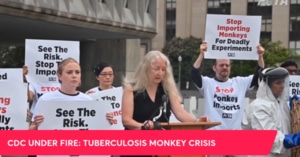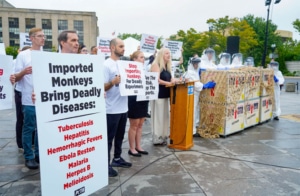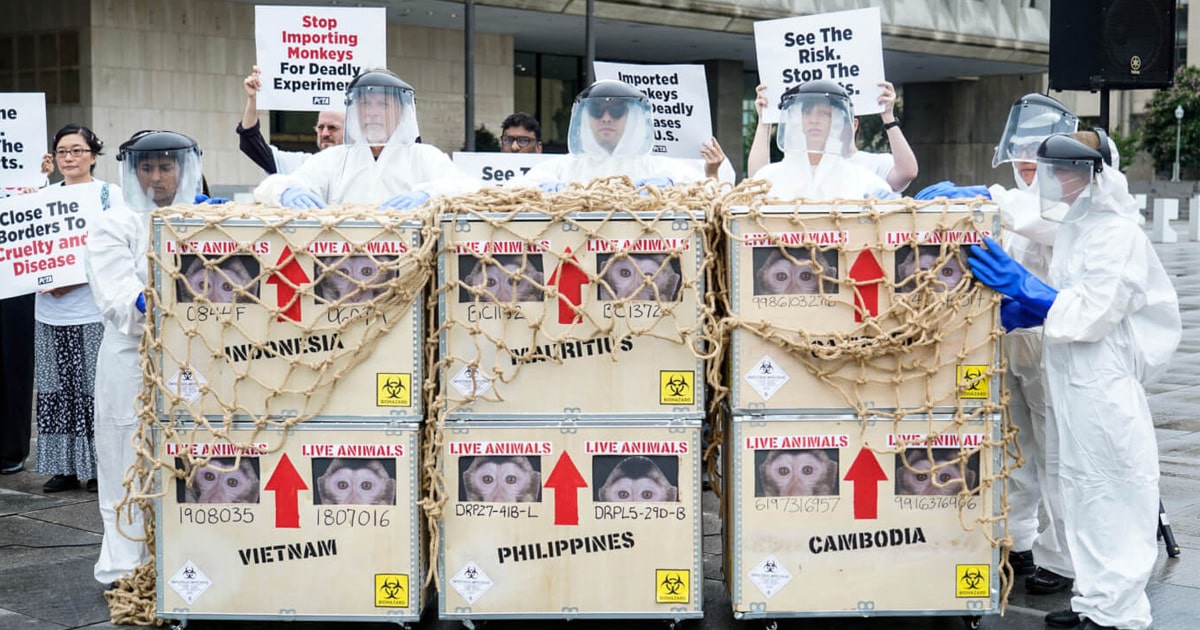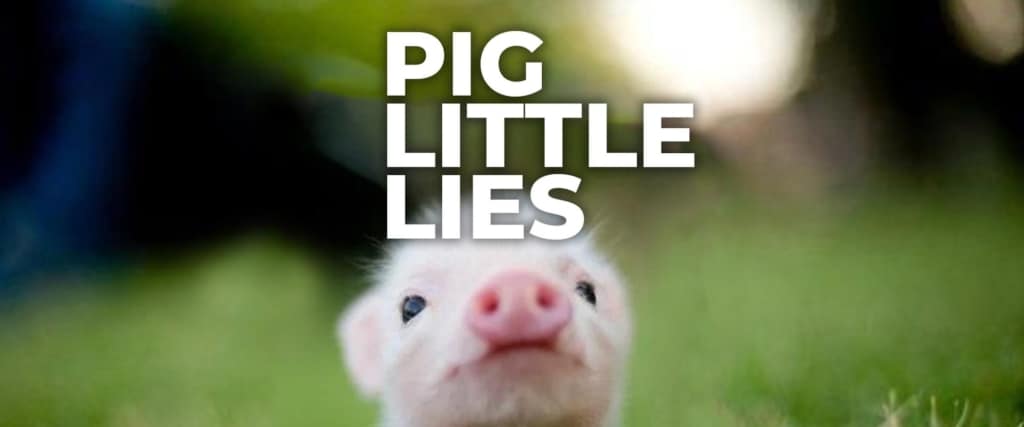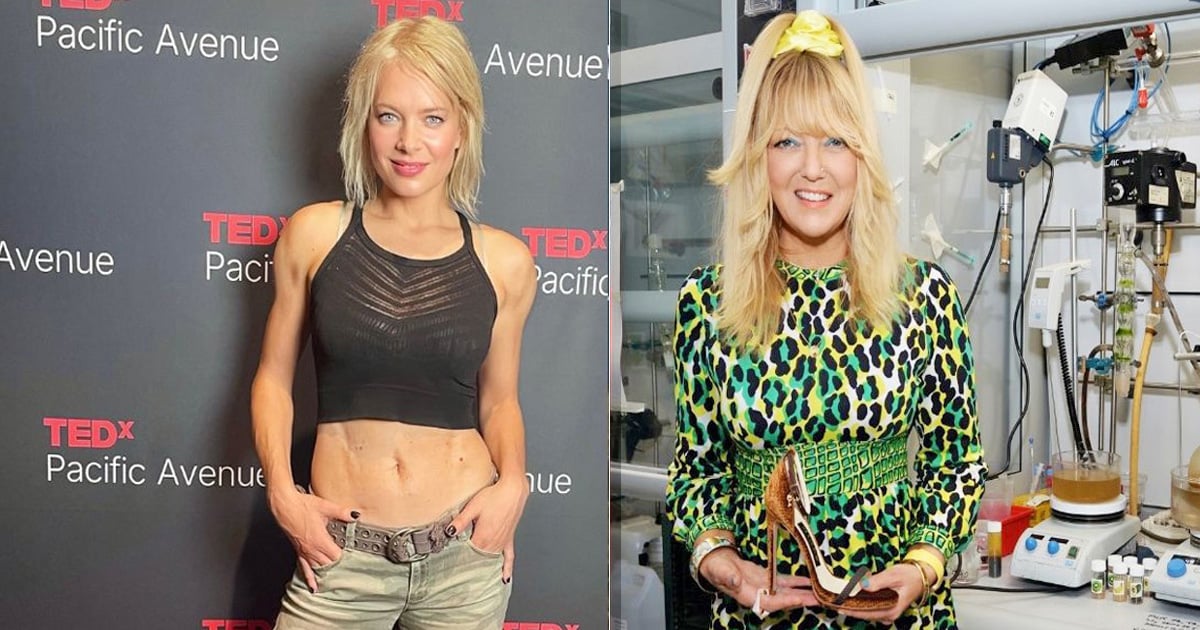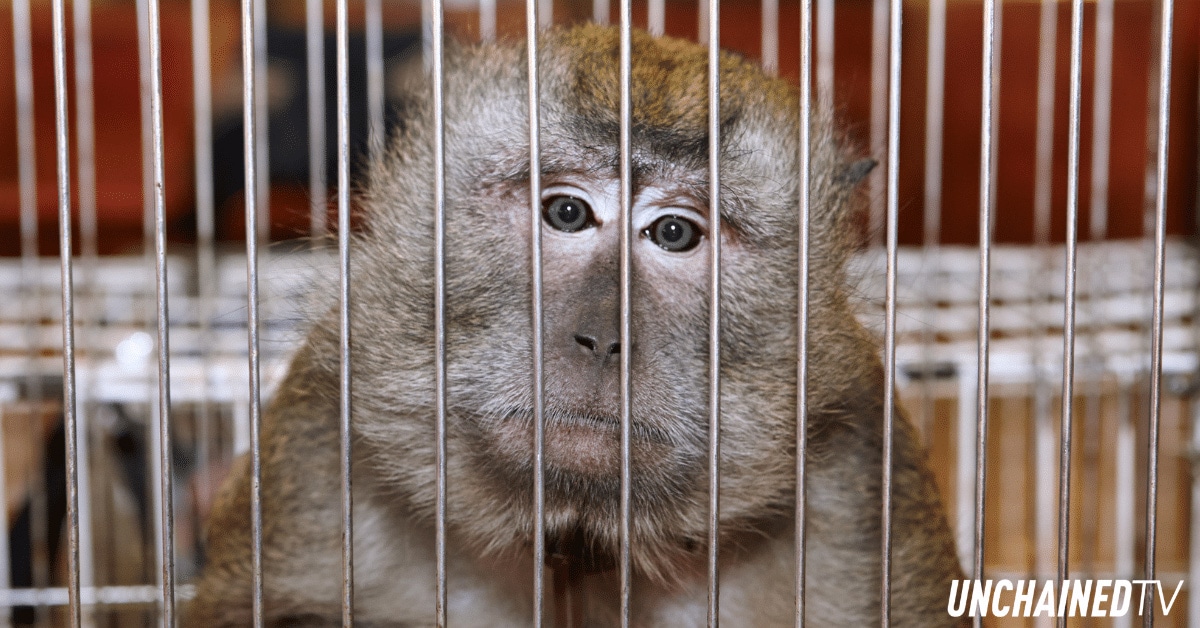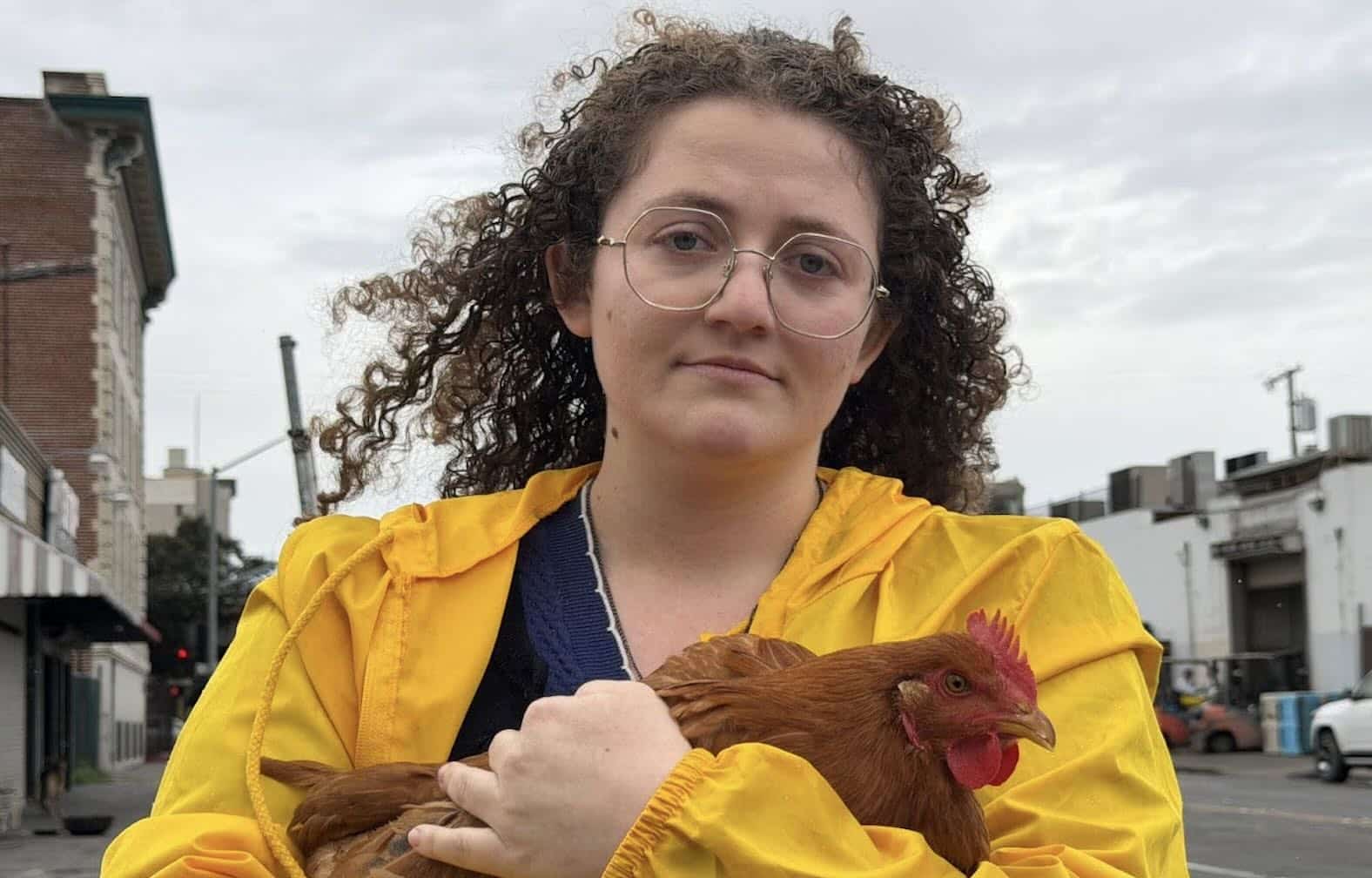[Speaker 4]
Live from the Unchained TV headquarters in Los Angeles, California, this is Truth Files with Jane Velez-Mitchell. Get in touch during the show on socials. And make sure you don’t miss any of Unchained TV’s award-winning programs by downloading the app to your phone, tablet, or smart TV.
And now with the headlines, it’s Jane Velez-Mitchell.
[Speaker 1]
Welcome to Truth Files with me, Jane Velez-Mitchell. Thank you for joining us. We are live on our streaming network as well as across social media.
Please comment, share out. Together, we can solve, let’s hope, this crisis. We’ve got some breaking news for you.
This is truly shocking. In a dramatic press conference held in Washington, D.C., right outside the U.S. Department of Health and Human Services, PETA has been raising the alarm on a shocking and largely hidden public health threat, the importation of tuberculosis-infected monkeys into the United States for use in laboratories. The CDC’s own data show that tuberculosis-infected monkeys imported from Southeast Asia and Mauritius made it through federal quarantine and into U.S. laboratories, carrying multiple strains of TB, including a strain that we have never seen before here in animals. A new peer-reviewed CDC paper, quietly published behind a paywall, confirms this. Tuberculosis sickens 10 million people and kills one in a quarter of them every year. It’s the world’s leading cause of death from a single infectious agent, according to the World Health Organization.
This deadly disease is coming into the U.S. and, ironically, going into the laboratories that are supposed to be curing diseases. Wow. Honestly, watching your news conference, I became frightened straight out to Dr. Lisa Jones’ angle of people for the ethical treatment of animals. This is horrifying. How did you find out about this? It’s the company’s own data.
It’s the importer’s own data. It’s the CDC’s own data. It’s the federal government’s own data that PETA submitted public records for.
We got the documents. We put the pieces together. This has always been out there, Jane, but it took kind of pulling all the spare pieces together to form this image or this picture of this pipeline that has been funneling disease, distress, TB-infected monkeys into the U.S. for years. The surge, the increase of TB-infected monkeys over the past few years, yeah, you have a right to be very afraid. Now, you had a very, very dramatic news conference out there, Lisa, where you spoke primarily, but there were a lot of people, as you can see here, holding these signs, tuberculosis, hepatitis, fevers, Ebola. Look at these folks in hazmat suits, and they are standing next to the very kinds of boxes these live animals are transported in.
Let me ask you, these importations are being done with our taxpayer dollars. Did the CDC respond to this news conference? Did Health and Human Services respond to your news conference?
Did anyone in the U.S. government, which has been so focused on getting rid of unnecessary spending, and this is many millions of dollars in taxpayer-funded importations, did any government agency respond to you? You know what the CDC told me when I first approached them? With their own paper, they said, hey, go talk to our press office.
I asked for data. I asked for analysis. I asked for them to explain why our data showed so many more infected monkeys were coming in than their own publication that they just quietly slipped in behind a paywall.
And that senior scientist’s response was, ask your questions of our press office. You know, Jane, when scientists refuse to engage in science, you’ve got to wonder what’s up or what is being covered up, I think is a better question. And since then, no, we’ve not heard directly from the CDC.
Now, the CDC is in complete disarray. I understand that. But we have been going to the CDC since 2022 with these concerns about TB and all these other pathogens, and each time the CDC has come back and said, looks fine to us, looks okay to us, I have to believe that at the highest levels of government, they are seeing what’s going on and that they are making decisions that will shut down this pipeline.
Well, you know, I’m terrified as just a citizen. We all just went through the COVID pandemic. This morning, I read an article, oh, I live in L.A. COVID is coming back to L.A. Should we start wearing masks in stores? I mean, this is a nightmare, whether you believe it started in the Wuhan lab as a result of experiments where animals were being tortured or whether you believe it started in the Wuhan wet market where animals were being tortured for food, either way, it’s because animals were being tortured that we had the pandemic, which nobody in the mainstream media discusses. And so now we have this other threat. And the irony to me, I mean, this is sort of I would call tragic irony.
If you look at the CDC’s mandate, it says our mission as the nation’s health protection agency, CDC saves lives and protects people from health threats. But you’re saying that they’re creating this health threat by bringing in monkeys who are infected with tuberculosis. I want to go straight out to Thomas Wade Jackson, who is a filmmaker and a musician who is from Bainbridge, Georgia.
We also have somebody else who’s from Bainbridge, Georgia. And Thomas, what I want to ask you is you are fighting a very insidious plan to put a laboratory monkey breeding facility in Bainbridge, Georgia, the largest apparently ever seen, many, many thousands of monkeys. When you hear now that some of these monkeys might be infected with tuberculosis, what runs through you?
[Speaker 2]
Man, you know, I listened to that press conference and I was really freaked out, especially knowing that what they’re trying to do in Bainbridge, because, you know, we live next to a river. And from everything I was listening to the podcast with Dr. Lisa this morning, she talked about the shedding of the animals and how they shed these diseases. And so, you know, if they ended up in Bainbridge, it would be very easy for this to get transmitted into the river and then to the lake where me and my daughter swim and come all the way down into Florida, affect all of Apalachicola and go further.
You know, it’s not good news. It’s definitely I mean, it might be good news in that if people wake up, they’ll stop doing this monkey, you know, stealing them from the wild and they’ll stop bringing them in and they’ll stop the testing. That’s the only good news I can find from it.
But if and but yeah, it’s a scary proposition.
[Speaker 1]
I’d like to go to Ivana Merritt. And I know you just joined us at the last second after hearing about this horror. You’re also in Bainbridge.
You’re fighting the monkey facility. What’s your reaction?
[Speaker 3]
And I hope you can hear me well. I hear you great. Okay.
I am exhausted, tired, frustrated. And it’s just it’s a disgusting thing. I hate that they are hiding behind the idea of that.
It’s for the progress of medicine. I think that is just disgusting. And people are falling for it.
[Speaker 1]
Are you going to use this discovery of tuberculosis infected monkeys coming into the United States? Perhaps. Could that be the basis of another lawsuit against the facility?
[Speaker 3]
It should be. And I know that I will absolutely be talking about it. I’ve gotten on a lot of people’s nerves talking about this, but I’m not going to stop.
I will absolutely bring that to everyone’s attention. We have a city meeting next Tuesday. I’ll speak about it there, too.
[Speaker 1]
Do you think people know about this? The tuberculosis, the tuberculosis.
[Speaker 3]
There’s no way they do. There’s no way they and our local our citizens here. They’re not just relaxed about it.
I think they’re scared to do something and say something about it. But this year, I don’t think they do. There’s no way they know how bad this really is.
[Speaker 1]
Well, I applaud you for fighting the good fight to stop this ginormous laboratory monkey breeding facility from coming into Bainbridge, Georgia. The people have united. And I want to play a clip of Thomas Wade Jackson speaking.
He’s from Bainbridge, Georgia, speaking about the battle to stop this laboratory monkey breeding facility. And then on the other side, we’ll talk about whether this discovery of tuberculosis-infected monkeys going into laboratories could really be a game changer in this battle.
[Speaker 2]
You’re not going to believe what they’re doing in Bainbridge, man. This company’s trying to come in and bring out, like, breed monkeys there. And I was like, what?
He said, we’re having a city council meeting tonight, man. You’ve got to come up. So I came up.
I was blown away. I was totally amazed. In my life in Bainbridge, I had never seen that kind of people turn out like that.
I was waiting in line to get in there. I never got past the doorway. And there were people behind me.
I’m like, holy cow. To come here and to see animal rights activists standing next to animal farmers, next to Republicans, next to Democrats, next to whatever, all the ways they divided us, we were all there. And that didn’t work for them.
You know, we were on common ground. Like, you could see the fear in the councilman’s eyes at how many people turned up. And when the PETA scientists got up there, Dr. Lisa, and she gave all this information, not only about animal testing, but about that company. And then V, man, that’s the speech you gave. That right there, when you gave that speech, I was thinking, dude, I am so proud to be from Bainbridge, Georgia, if this is where Bainbridge, Georgia is going. Like, holy cow.
[Speaker 1]
I do feel, having covered many of these monkey issues, that this could be a game changer. I don’t live anywhere near Bainbridge, Georgia, but if somebody told me they were going to put a laboratory, ginormous laboratory breeding facility right near my home. And by the way, tuberculosis infected monkeys could very well be in there spreading tuberculosis to humans that are then going to go to the local sandwich shop and spread it to me.
I would be freaked out, Dr. Lisa Jones Engel. These communities are being asked to basically absorb the risk of this dirty monkey trade. And places like Bainbridge, places like Brazoria, Texas, they’re saying, no, they are not going to put their health over the profit or under the profit of these big companies.
We’re just like, yeah, we just want monkeys. We’re just going to keep bringing as many monkeys in. We don’t care whether they have TB or hepatitis or Burkholderia.
As long as we can bring them in, as long as we can get paid for using them, we do not care about the communities. That is going to stop. And I do believe that Bainbridge has drawn the line in the sand.
This company is now, what, two years behind their plan, their timeline for when they were supposed to have their first monkeys coming out the doors? They’re still tied up in knots in the courts. With people like Thomas and Veena, no.
And then when you add the public health, the biosecurity, the national security risk that these imported animals represent, no one in their right minds would allow this to continue. Now, thank you. I’m going to go back to Vee.
You were nodding your head up and down. Talk to us, Vee, about your reaction. I mean, this is a shocker.
[Speaker 3]
It is so outrageous. It’s been a year and eight months that we’ve been fighting this. And every day I have to, like, pinch myself and say, is this real?
Because it’s so ridiculous. It’s just I don’t I can’t believe I’m fighting something like this. There’s no way this should have even made it through this far, you know, so it’s just just hearing all these things.
I don’t know. It’s ridiculous. But every now and then I say, you know, it’s thank God it was monkeys because we wouldn’t be paying attention.
And like Thomas said, you know, I almost cried seeing that clip because that is so true. It brought people together. Everybody’s fed up.
Farmers, people who hunt on a daily basis. They’re against it. It’s a lot.
It’s a lot of people speaking out, speaking up and man, it’s just it’s sick. It’s really sick. I’ve lost.
I’m at a loss of words. I’m really disgusted.
[Speaker 1]
Well, also, there was a great point here. Why isn’t this story getting more media attention? And I know Bainbridge has gotten a lot of media attention, but I want to go back to Dr. Lisa Jones Angle. You held this incredible news conference outside Health and Human Services. You have the CDC report to back it up. You’ve got it on paper.
And yet it didn’t seem to get the kind of media attention that it should have gotten. I mean, the idea of tuberculosis infected monkeys. Take it away.
You’re right. You know, C-SPAN streamed it, so I know that it was showing up in the halls of Congress and the Senate, and that’s really, really important. But to your question, why?
Why do we not dare? Why does the media not dare talk about it? Is it too complicated?
I don’t think so. You have imported monkeys infected with a pathogen that can cause disease in humans, in other monkeys, in other animals, in cattle that can be shed into the environment, that can make its way through water systems. How much more straightforward do I need to lay that out for you before you stop underestimating your readership, your viewership?
People see these images. People know what tuberculosis is. People are astonished to realize we are still using primates in experimentation in the 21st century.
The media needs to buck up and actually put this out there and then hold the big companies accountable, because you know what? I think that’s actually what it is, Jane. This is a multibillion-dollar industry.
You’ve got massive international companies who are saying, don’t you dare try to take a single monkey out of our hands. Well, what I find also very interesting is what’s happening at the CDC right now. And this is breaking news, so there I’ll go with my breaking news banner.
But I know that an award was going to be given to the new head of the National Institutes of Health, Jay Bhattacharya. And it was that dog on the right signed by thousands of people saying thank you for transitioning away from animal experimentation, which he had spoke about doing. There’s videos of him talking about non-animal models and how it’s much more modern, blah, blah, blah.
And nonetheless, take a look at the amount of money going to universities from our tax dollars to torture animals. And I think that it’s worth reading, because it’s just so stupid. Almost half a million dollars to addict monkeys to cocaine, alcohol, nicotine, and various other things, forcing them to choose between drugs or food.
Now, I just want to say, as a recovering alcoholic, 30 years sober, over 30 years sober, it’s a spiritual problem with the spiritual solution, and torturing monkeys ain’t going to get you to sobriety. And anybody who is a recovering addict or alcoholic can tell you that. This is a waste of money, and it’s torture.
And then you look at more than half a million dollars to inject menstrual tissues into the abdomens of baboons and mice purportedly to study endometriitis, which neither species experiences. Then there’s more than half a million dollars to create hot flashes in monkeys by taking out their ovaries. Then there’s almost a million dollars to force newborn monkeys to wear helmets that plunge them into darkness and distort their vision and subject them to multiple invasive surgeries, implanting a post into their skulls, inserting electrodes into their brains, affixing coils onto the outer white surface of their eyes.
I could go on. Those are just some of the highlights. This is morally reprehensible, and I am disgusted that my tax dollars are going to that.
And I got to say, you know, again, you’re shaking your head. Does that enter the conversation? Because I know Thomas had said this issue is bringing everybody together, conservatives, liberals, like you said, hunters, vegans, everybody’s coming together in Bainbridge, Georgia, to try to stop this monkey breeding facility.
[Speaker 3]
We live what they call the Bible. This is like the most Christian place you could imagine, like over, you know, overly hardcore Christian location. Reading that, I don’t know how a person can think they can get to any pearly gates.
And we are contributing, contributing to an industry that does that. If they even do it, because to me, I think it’s just a money thing. I don’t even know if they’re really doing the research.
But to hear that, that that is the plan, and that’s what that money’s for, I don’t know anybody’s religion, but I can’t get to no peace after life knowing that I live in a place that contributes to that. That is madness to me. That is insane.
I can cry just reading that. That’s sick.
[Speaker 1]
V, are you going to use this tuberculosis information to upscale the battle to stop the monkey breeding facility? Well, I want to say, Thomas, you are not only a filmmaker and a musician, you are doing a documentary on the battle to stop the, and this is breaking news, people, you’re hearing it here first. A documentary is being produced by Thomas Wade Jackson, who is an award-winning filmmaker, and some of his films are on Unchained TV, our streaming network, to stop the laboratory monkey breeding facility in Bainbridge.
And you even have written an anthem. Let’s hear it.
[Speaker 2]
Don’t believe the hate they sell, yeah, don’t believe their lies. Because their whole plan is to separate, to conquer, and divide. Is there a way that if ever we were finally to unite, all their secret evil schemes would be defeated by the light?
Hallelujah, now let’s all get together, let’s all sing a song. Because if we can’t find common ground, then we ain’t got very long.
[Speaker 1]
I love that song. And, you know, I think it sums up everything about this battle, is that most Americans are kind people who don’t want to torture monkeys, and we don’t want to see our hard-earned tax dollars going to monkey torture, Thomas Wade Jackson.
[Speaker 2]
Well, you know, it was being in that first meeting that really made a big impact on me, that just stuck with me, because we were during the most divisive election time in our country, you know, and people from all sides of the aisle were coming together. And so it was a couple months after that meeting that I wrote that song, and I wasn’t specifically thinking about the meeting, but I was thinking about all the ways they’re trying to get us to hate each other. So I was inspired by that, that night.
And I was in the middle of finishing an album with the band I’m in, so I didn’t really want to make another documentary. And being from Bainbridge, seeing the people that showed up, seeing the fear in the eyes of the councilmen, I said, this is going to blow over. There is no way this is going to last more than a month or whatever.
Like, they’re going to be shamed out of town. Like, I could not imagine. Maybe it’s just because I wanted to work on the album.
But it was only like a year or so later, over a year later, at Mother’s Day this year, when I was at home and my mom said that Safer Human Medicine had just won this appeal, and that they were still planning to go straight ahead. And I thought, what the heck? It was like I felt led when I was made a prayer for compassion.
That same urgency and feeling came upon me that day. And I felt, yeah. You know, I mean, for me, like the story, I really believe we’re going to win, man.
There’s no way this is going to happen. I just cannot see it happening. But what I have witnessed in interviewing people and just watching it all unfold is that in the end, it will be such a blessing to Bainbridge.
It has brought people together that would never have come together. It has created unity in a way and has created people that show up at meetings. There’s an election coming up.
They’re having meetings about the election, you know. So I feel like this challenge that was placed upon the citizens of Bainbridge is going to bless them in the end, and Bainbridge will be blessed. But right now, we’re still in the fight because Safer Human Medicine has not said in any way that they’re backing down.
[Speaker 1]
Well, let’s listen to more of the news conference that was held outside the Department of Health and Human Services by PETA, because the details are truly terrifying to me. And I really believe upon hearing this news conference and then also thinking about the battle to stop this massive laboratory monkey breeding facility in Bainbridge, that there’s a convergence there because you make the point in your news conference that the states are not being informed of this threat, and Georgia is a state. Let’s listen and talk on the other side.
Between 2021 and 2024, their own data showed that 69 infected monkeys arrived on 17 separate shipments. Each year, the number of shipments increased with infected animals. Even worse, the CDC’s quarantine missed nearly one in five infected monkeys.
Half of those missed animals came from shipments where another monkey had already tested positive. You don’t need to be an epidemiologist to see the recklessness of this. In some cases, monkeys cleared from quarantine were diagnosed 27 months later with the same strain that had already been detected in their original shipment.
In other cases, new strains surfaced months down the line. And in many cases, no strain data were reported at all. I mean, we have no idea what type of mycobacteria tuberculosis those animals were carrying.
The implication is unavoidable. The CDC knowingly releases thousands of imported monkeys that have been exposed to TB during quarantine. And by releasing exposed monkeys, the CDC ceded reservoirs of TB in laboratories and breeding facilities across the nation that house tens of thousands of additional monkeys.
Wow. I want to go back to Dr. Lisa Jones-Engel. How could this be used by the people of Bainbridge to stop the facility?
Because, again, what you’re saying is that it’s seeded in there, that the tuberculosis could pop up at any time. And that’s really terrifying. Yeah, it is terrifying.
And the thing is, Jane, we’ve known about this, again, for decades. We do not have, we, the biomedical community, does not have an effective test to detect tuberculosis in monkeys. We don’t.
We’ve known that. And yet, we’ve continued to allow tens of thousands of these monkeys in. And the seeding, let me just kind of explain that a little bit.
So a monkey comes in. He spends 31 days in quarantine, takes the tests that don’t work, is released, and maybe they’re sent to a facility in Georgia or a facility in Washington State or Texas or Ohio or Louisiana or wherever. Or Georgia.
Let’s hope not, but let’s just hope.
[Speaker 4]
Let’s hope not.
[Speaker 1]
But if they go there, you know, and there are already other animals in that facility that have been there. And this monkey starts shedding this mycobacteria. You know, TB is aerosolized, meaning that it’s aerosolized droplets that are the primary route that allows it to move between monkey to monkey or human to human or human to monkey.
But it also can be shed in the feces. It can be shed in the urine. These facilities, like the Bainbridge facility, they’re proposing 30,000, 40,000 monkeys in that.
You take that incredible density of monkeys. You put in these animals who are actively shedding this pathogen, and I promise you, it is going to swirl in that facility. And you will have animals get infected.
Some will be actively infected. Some will develop latent infection. You will have workers exposed.
You will have wildlife that comes wandering up to the outsides of these facilities, potentially exposed. You could have the cattle in the area, potentially exposed. This is a recipe for allowing this pathogen to basically find its way out into the community.
And Bainbridge is the line that’s going to say, no, not here, not now, not ever. And, you know, with people like Veena and Thomas, Safer Human Medicine, it’s interesting. You notice how they haven’t responded?
The industry does not respond to these questions of TB, because the only answer they could give is, yeah, we know it’s a problem. We know our animals are an infectious disease threat. We know that the presence of TB in these animals makes any data that we get from them even more suspect.
Everything is wrong with this system. I really feel like this is something that needs to be brought up at your next meeting. And, V, you’re shaking your head.
I know you said there’s a meeting coming up. I just have followed these kinds of battles for years. You know, there was an attempt, and by the way, we invite Safer Human Medicine, any of these companies on at any time.
We would love to dialogue with you. Absolutely. And, yes, PETA agrees.
Let’s have a dialogue. Let’s talk about it. But as far as the upcoming hearing that you’re having or meeting you’re having, V, how might you bring this into the conversation, given what you’re hearing today and given the news conference PETA held with the documentation from the CDC itself?
[Speaker 3]
We actually have a meeting tomorrow regarding a tax increase. So I would like to mention how taxes, you know, some of our officials have threatened citizens about basically if we fight this thing, our taxes are going to go up because they got to pay for legal fees or whatever. So I want to mention, you know, if you fight more, you know, you’re raising taxes already.
But we have something going on that, you know, I’ll tie that in some kind of way, but I want to do research on our local hospital because I know from, I want to say a fact, our local hospital cannot handle an outbreak. COVID was a nightmare for us, but even a common flu, our hospital is not equipped.
[Speaker 1]
And what about tuberculosis?
[Speaker 3]
Oh, you can forget about it. You can forget about it. Not equipped.
Our hospital is not equipped for something like that. Absolutely not. In no way.
And we brought this up because one of the city council members is on the hospital board. So we have brought up the, you know, the hospital not being equipped for any kind of outbreak from these monkeys. It’s been said, but now it’s going to be said again.
[Speaker 1]
So I’m looking at, thank you for that, V. I’m looking at what PETA sent, biosecurity threat monkey imports are bringing tuberculosis into U.S. labs. And latent TB continues to slip past outdated screening emerging months or years later in primate colonies and in some cases infecting workers.
Because I went on the CDC and was bumping around the internet, and there is an acknowledgement by them in some of their writings that monkeys with TB have entered. In other words, you can find it online. I know you have a report, but you can also find it online.
But there’s always this thing about, oh, it’s low risk. It’s low risk. What do you say to that, Dr. Lisa?
Yeah, the CDC, they often come back to me and say, hey, we have not had any worker during quarantine get infected with TB. And I’m like, well, that’s not a big surprise. That’s actually not true.
Back in the 90s, you had workers get infected with TB and back in the 70s and 80s. But, you know, when these facilities, once these animals leave the CDC quarantine, they’re going into facilities where people are not dressed head to toe in Tyvek suits, where the biosecurity awareness and regulations are certainly not nearly as strict. But even beyond that.
So epidemiologically, we may not see a massive TB outbreak from exposure to human, even though we have been infected humans actually in Michigan just a couple of years ago. But when a monkey is infected with tuberculosis, that means that all these other infections that they have are amplified. So they are going to be shedding other pathogens like burkholderia, hepatitis, campylobacter, Shigella, Yersinia, Salmonella, potentially filoviruses, because TB is like an accelerator for these pathogens in these monkeys.
So you insert one TB infected monkey into a colony and you allow and you guarantee the rest of the animals going to get infected. It’s not just the TB that you have to worry about at that point. You have to worry about every single other zoonotic and deadly pathogens that are present at that time because they will come out.
They will come out the monkeys. They will come out of the facility. They’ll come out into the environment.
They’ll be picked up by wildlife. They’ll be picked up by domestic animals. They will be picked up and transmitted by the husbandry and care staffs themselves.
I would like to weigh in as a journalist, as a taxpayer, as a member of the human race. This story makes me embarrassed once again to be a human being. It makes me embarrassed to be a human being, to see the torture inflicted on these highly social, intelligent, sensitive, and it doesn’t matter how smart they are.
If you have somebody who’s suffering severe dementia, does that mean it’s okay to torture them? No. Okay.
So this is medieval. And politics aside, because we don’t get involved in partisan politics. We’re a 501C3 nonprofit.
But the fact is, we all know, anybody who’s looked at a newspaper in the last several months, that there’s been a lot of cutting of government waste, hypothetically. Why the heck is this still going on? These nonsensical experiments should be the very first thing to be cut.
The very first thing. Injecting menstrual tissue into the abdomen of baboons. Creating hot flashes in monkeys by taking out their ovaries.
Making newborn monkeys wear helmets that plunge them into darkness. This is sick, sick stuff. And I think the people doing these experiments need to be tested for their mental health.
Are they sociopaths? And it’s all about the money. Follow the money.
This is a huge, huge business. And that’s why I always have, when I talk about this stuff, a little video of money. Because that’s what it’s all about at the end of the day.
The universities conducting these horrific experiments, when they get grants from the government, they get a cut. They get a cut, so they don’t want them to stop. And these horrific experiments are going on in universities around you.
Okay? The universities you walk by, they’re happening inside closed doors in these universities. And it’s got to stop.
And I know the National Institutes of Health recently showed some promise in saying that they wanted to stop a lot of these ridiculous experiments and go to non-animal models. This is the 21st century. We have organs on a chip.
We’re not taking horses and buggies across town to get from point A to point B. There is no need to be doing these experiments. It’s a waste of taxpayer dollars.
And now we know it’s a threat to human health. So I certainly hope when you have your meeting tomorrow, V, and I hope Thomas goes, too, if you can, to bring this up as breaking news. Because as you showed, everybody in that town, which is a very, very conservative, religiously oriented town, whether you’re young, old, black, white, liberal, conservative, male, female, everybody’s getting together and saying, we don’t want this.
So let’s have some final thoughts. I’ll start with Thomas. Your final thought on how this horrific discovery about the tuberculosis-infected monkeys coming into the United States might impact, A, your documentary on your battle to stop the Bainbridge, Georgia, giant monkey breeding facility, and, B, the battle itself.
[Speaker 2]
You know, one could hope that, well, my documentary is based on the battle, so it’s all connected. One would hope that this would affect it immediately. But I’ve come to see that we don’t know.
The main thing is to stay vigilant every day and keep our eyes open. And I just want to say one other thing, because we were talking earlier about the diversity of the town, and you were talking about it being a religious town. And what’s really, from the first night when Dr. Lisa spoke and you saw all the people, like, they were trying to tell her she couldn’t speak anymore. She was asking for one more minute, and everybody said, she can have my time. She can have my time. People were applauding.
You know what I mean? And being an animal rights activist for, like, a decade or more and vegan for 20 years this year, I couldn’t believe it. You know, this is my hometown, and people are, like, praising PETA.
And so as I interview people, so many people have talked about how, if you see the trailer we made, you see the people say, you know, bless PETA. We’re grateful for PETA, because without PETA, they would have already been in there. Like, PETA really is a main part of the story.
And so I went to a prayer meeting, speaking of the religion, and they were praying for PETA. So, yeah, it’s a sweet thing that’s happening there, but it’s a sad thing that they’re having to go through this. But people are waking up, and I hope that this wakes us up to other things, too, because everything’s connected.
You know, like, let’s just start getting rid of Safer Human Medicines and all the companies like that that want to exploit monkeys and torture them in any way and let the monkeys live their life.
[Speaker 1]
Thank you, Thomas.
[Speaker 2]
I just can’t thank each one of you are heroes to me, so I just thank you all.
[Speaker 1]
Well, right back at you. Can’t wait to stream that documentary on Unchained TV, where you have other documentaries as well that have won awards. All right.
Lisa, I’m going to give you the second word here, the second to the last word. You know, the CDC has closed the pipeline down before, has closed the borders before. When rabies outbreaks back in the 2020 through 2024, they shut that pipeline down.
With monkeypox, with African rodents, they shut it down. Why will they not shut it down for TB-infected monkeys? Maybe because CDC is also a client.
They are buying these monkeys from the importers as well. So I think that’s another piece of this puzzle. And to Davina and Thomas, I will never, ever forget that moment after speaking at that first meeting and turning around and having your entire community standing and applauding, because you’re right.
I walked in there as a PETA person, and I thought, what am I stepping into? And this entire community has stepped up, and you’ve embraced the science, you’ve embraced the monkeys, you’ve embraced each other, and you’ve embraced us. And I am forever grateful.
PETA is forever grateful for what you are doing, because you are the boots on the ground on this one. Wow. So emotional.
Vee, we’re going to give you the last word.
[Speaker 3]
Man, it’s so much. This has been a journey, and it’s still a marathon. It’s still a fight, because I’m not done until I’m done.
But I think this tuberculosis update is going to be a positive change for this fight. Just like when the monkeys got out in South Carolina, that kind of awakened something in a lot of people. It made it real.
So I think this here is going to help a lot. And I want to say thank you to Dr. Lisa, Thomas, Miss Jane. Thank y’all, because this is a fight.
It is a fight.
[Speaker 1]
Let me say this. I said you were going to have the last word, but guess what? I’m going to have the last word.
I have been following PETA’s work since almost they started, pretty much, when I was just a cub reporter in Philadelphia. And somebody sent me video of some horrific head injury experiments being done on primates. And I said, this is sick.
We’ve got to stop it. And that was many decades ago. And PETA has been relentless ever since.
And I am a huge fan. I was in Puerto Rico for a journalist conference when two women walked up to me. And it was many years ago.
It was right the day Michael Jackson died. And I remember it was my biggest story ever. I covered that case for many years.
And I was totally out of pocket. And I said, why is this happening that I’m out of pocket on the biggest day of basically the career that I had covering very big cases? And these two women walked up to me and they said, we’re from the Puerto Rican Bar Association Animal Rights Subcommittee.
And you know that they’ve built a giant monkey breeding facility in Guayama, Puerto Rico. And we can’t stop it because they already built it. But it’s in violation of all these codes.
And they just ignored everything. And they just built this facility. And we’re distraught.
But we can’t do anything about it. I said, never say you can’t do something before you’ve tried. And PETA got involved and fought it all the way up to the Puerto Rican Supreme Court.
And mind you, this was a facility that was already built. And it did not open. And it was I knew the reason I was there was to talk to those two women and to learn about that.
And, you know, I did my little part, but it was PETA’s relentless fight legally taking it all the way to the Puerto Rican Supreme Court that stopped it. And so I say that to you in the sense that this has been going on for a long time and it will keep popping up here, there and everywhere. But I will stay on top of this story.
Please let us know what happens at this next meeting. And I look forward to your documentary. Never give up.
That story is proof that it can be stopped. So I appreciate everybody coming to this event. Please know that Unchained TV is a nonprofit streaming television network to encourage the compassionate lifestyle and fight for animal rights.
And it’s all free. You can watch it online at unchained.tv. So it’s a vegan Netflix. OK, that’s the craziest thing I’ve ever heard.
I love Unchained TV.
[Speaker 3]
Unchained. Unchained TV. Your life will change.
It’s just that easy.
[Speaker 1]
Unchained TV has all sorts of content for everybody. Unchained TV changed my life. Unchained TV is crushing it.
I love Unchained TV. Unchained TV is my go-to. Unchained TV.
Who knew? Unchained, baby!

